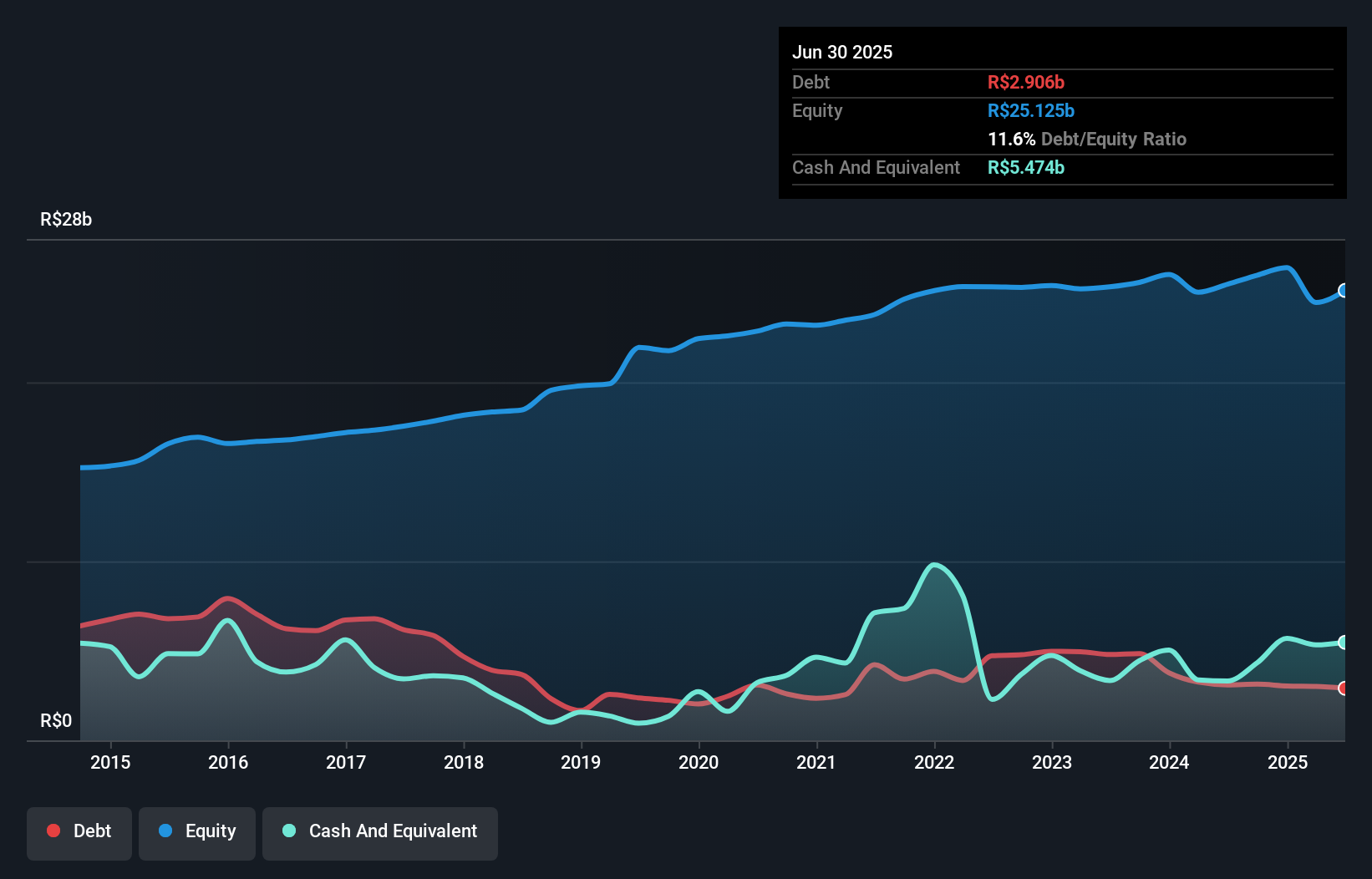The external fund manager backed by Berkshire Hathaway's Charlie Munger, Li Lu, makes no bones about it when he says 'The biggest investment risk is not the volatility of prices, but whether you will suffer a permanent loss of capital.' When we think about how risky a company is, we always like to look at its use of debt, since debt overload can lead to ruin. Importantly, TIM S.A. (BVMF:TIMS3) does carry debt. But the real question is whether this debt is making the company risky.
When Is Debt Dangerous?
Debt assists a business until the business has trouble paying it off, either with new capital or with free cash flow. Ultimately, if the company can't fulfill its legal obligations to repay debt, shareholders could walk away with nothing. However, a more frequent (but still costly) occurrence is where a company must issue shares at bargain-basement prices, permanently diluting shareholders, just to shore up its balance sheet. Having said that, the most common situation is where a company manages its debt reasonably well - and to its own advantage. The first step when considering a company's debt levels is to consider its cash and debt together.
What Is TIM's Net Debt?
You can click the graphic below for the historical numbers, but it shows that TIM had R$2.91b of debt in June 2025, down from R$3.10b, one year before. But it also has R$5.47b in cash to offset that, meaning it has R$2.57b net cash.

How Healthy Is TIM's Balance Sheet?
We can see from the most recent balance sheet that TIM had liabilities of R$14.9b falling due within a year, and liabilities of R$17.0b due beyond that. On the other hand, it had cash of R$5.47b and R$6.35b worth of receivables due within a year. So it has liabilities totalling R$20.0b more than its cash and near-term receivables, combined.
This deficit isn't so bad because TIM is worth a massive R$55.9b, and thus could probably raise enough capital to shore up its balance sheet, if the need arose. But we definitely want to keep our eyes open to indications that its debt is bringing too much risk. Despite its noteworthy liabilities, TIM boasts net cash, so it's fair to say it does not have a heavy debt load!
See our latest analysis for TIM
One way TIM could vanquish its debt would be if it stops borrowing more but continues to grow EBIT at around 13%, as it did over the last year. There's no doubt that we learn most about debt from the balance sheet. But ultimately the future profitability of the business will decide if TIM can strengthen its balance sheet over time. So if you want to see what the professionals think, you might find this free report on analyst profit forecasts to be interesting.
Finally, a company can only pay off debt with cold hard cash, not accounting profits. TIM may have net cash on the balance sheet, but it is still interesting to look at how well the business converts its earnings before interest and tax (EBIT) to free cash flow, because that will influence both its need for, and its capacity to manage debt. Over the last three years, TIM actually produced more free cash flow than EBIT. That sort of strong cash generation warms our hearts like a puppy in a bumblebee suit.
Summing Up
While TIM does have more liabilities than liquid assets, it also has net cash of R$2.57b. The cherry on top was that in converted 150% of that EBIT to free cash flow, bringing in R$8.8b. So we are not troubled with TIM's debt use. Above most other metrics, we think its important to track how fast earnings per share is growing, if at all. If you've also come to that realization, you're in luck, because today you can view this interactive graph of TIM's earnings per share history for free.
If, after all that, you're more interested in a fast growing company with a rock-solid balance sheet, then check out our list of net cash growth stocks without delay.
Valuation is complex, but we're here to simplify it.
Discover if TIM might be undervalued or overvalued with our detailed analysis, featuring fair value estimates, potential risks, dividends, insider trades, and its financial condition.
Access Free AnalysisHave feedback on this article? Concerned about the content? Get in touch with us directly. Alternatively, email editorial-team (at) simplywallst.com.
This article by Simply Wall St is general in nature. We provide commentary based on historical data and analyst forecasts only using an unbiased methodology and our articles are not intended to be financial advice. It does not constitute a recommendation to buy or sell any stock, and does not take account of your objectives, or your financial situation. We aim to bring you long-term focused analysis driven by fundamental data. Note that our analysis may not factor in the latest price-sensitive company announcements or qualitative material. Simply Wall St has no position in any stocks mentioned.
About BOVESPA:TIMS3
TIM
A telecommunications company, provides mobile, fixed, long-distance, data transmission, and broadband services in Brazil.
Solid track record and good value.
Similar Companies
Market Insights
Community Narratives



